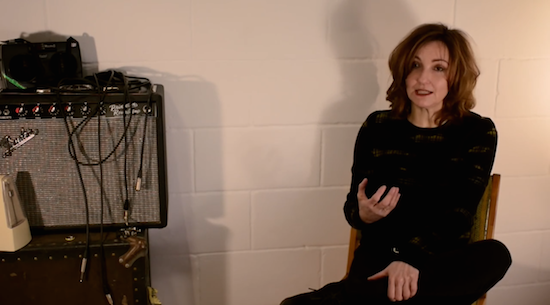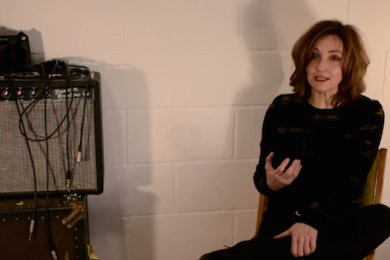This evening’s Faber Social has words, art and music in honour of Viv Albertine, whose recent memoir has confirmed her place in the paradoxical ranks of punk royalty. (90s nostalgia loses what little glitter it had when you consider that the 70s are fast approaching their own jubilee.)
During the panel discussion that ends the evening, Albertine’s former bandmate Tessa Pollitt recalls how physical and verbal violence and hostility was just another day in the life of a girl punk band. She remembers coming home from the Screen on the Green cinema in miniskirt and fishnets, and narrowly escaping getting beaten up because of what she was wearing. Things like this remind you not only that punk really was pioneering for women, but also that the social, sexual and sartorial freedom it allowed was hard won. Albertine herself is on record, in Zoe Street-Howe’s biography of the Slits, as having had to "toughen up" in order to face down constant hostility on the streets, to a point where she found herself unrecognisable.
Screen on the Green is within spitting distance of tonight’s venue, and at first glance you’d think a woman dressing how she wants would never have to fear the same reaction these days. (Certainly not in this room. Standing at the bar is at times like being at a Stoke Newington dinner-party where someone’s nicked the dinner-table but everyone is too polite to mention it.) And then you think about it some more. We keep being told that feminist close-combat is over, but in a world of street harassment, Slutwalks and #everydaysexism – not to mention tabloid demonisation of single mothers and feckless binge-drinking teenage girls – walking down the street can still be a battle. It helps to learn how not to give a fuck. The Slits learned this too, becoming a bulletproof girl-gang, weaponising femininity and resisting commodification not as a calculated pose but as reflex, instinct, necessity.
Some of the legacy of this weaponising and resistance can be glimpsed in Anat Ben-David’s set tonight. A more compelling performance artist than a recorded one, she combines music with her physical presence, video projections, and cut-glass vocals reinforced through doubling and layering, creating an arresting immersive experience. She throws shapes that go from elegant to violent, her voice ricocheting between shrill and stentorian. Like the Slits, she’s concerned with dissecting the cosmetic and consumerist and with deconstructing music-making itself.
The lack of shame with which the Slits and other punk women looked at female sexuality – not simply the body’s form but its masturbatory and menstrual functions – broke new ground for female performers too. Tonight’s second support, "live artist" Bryony Kimmings, is arch and unapologetic as she tosses off her songs and spoken-word skits on heartbreak, Christian celibacy, flats with thin walls and enthusiastically, enragingly sexual neighbours. Her high-femme armour – a glittery gold hairbow and outsize Tatty Devine necklace – are worn aggressively, and she animates her chosen persona with wit and articulacy, even with her hand between her legs and even when performing a pastiche of Subterranean Homesick Blues whose lyrics are all euphemisms for "cunt". This is one way to not give a fuck.
Between sets, Tessa Pollitt DJs, the reggae and dub she spins a reminder of that music’s heavy influence – far more than contemporary punk had – on the Slits’ sparse and spacey hymns to sex and shoplifting. She slips in the Slits’ own ‘New Town’, from 1977 but still sounding ahead of its time. The song jerks and creeps through similar streets to the Specials’ ‘Ghost Town’, but with its terrors more sketchily, nervily outlined. A lot of punk women dealt, on and off the record, with the struggle to confidently occupy public space.
In the closing Q and A, Albertine’s schoolfriend recalls her early attachment to glam rock, the Woodcraft Folk ("run by communists but they pretended it wasn’t"), and country dancing, before she took the time-honoured escape route of art college. Pollit and the group’s producer Dennis Bovell recount the group’s foundation and rise against a backdrop of "violent times", with white and black youth confronting state and police. Although acknowledging that she, Albertine and the late Ari Up valued chemistry over technical ability in producing their music, Pollitt stresses the disciplined nature of their rehearsing, and Bovell recalls the control they exercised in studio and post-production, as well as their self-deprecating humour and refusal to take seriously the context in which they operated. What comes across is Albertine as a woman empowered, like many, to self-actualise through punk, which offered women in particular an alternative to their expected roles as workers, wives and consumers. For Viv, it allowed her to develop the iconic confrontational self-presentation and a wry frankness about sex and sexuality that also informs her memoir.
<div class="fb-comments" data-href="http://thequietus.com/articles/15553-live-report-faber-social” data-width="550">



